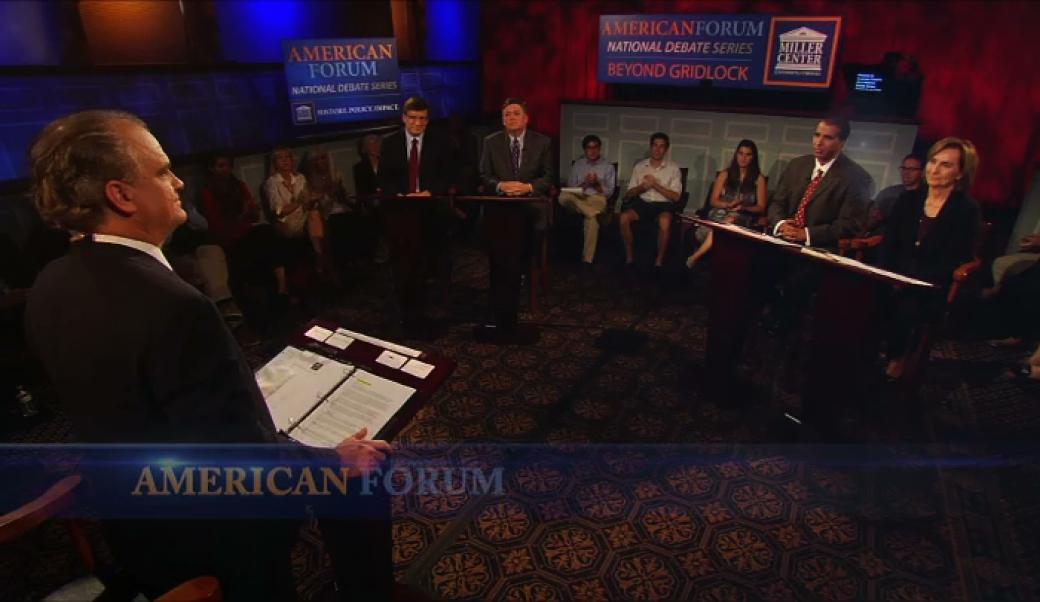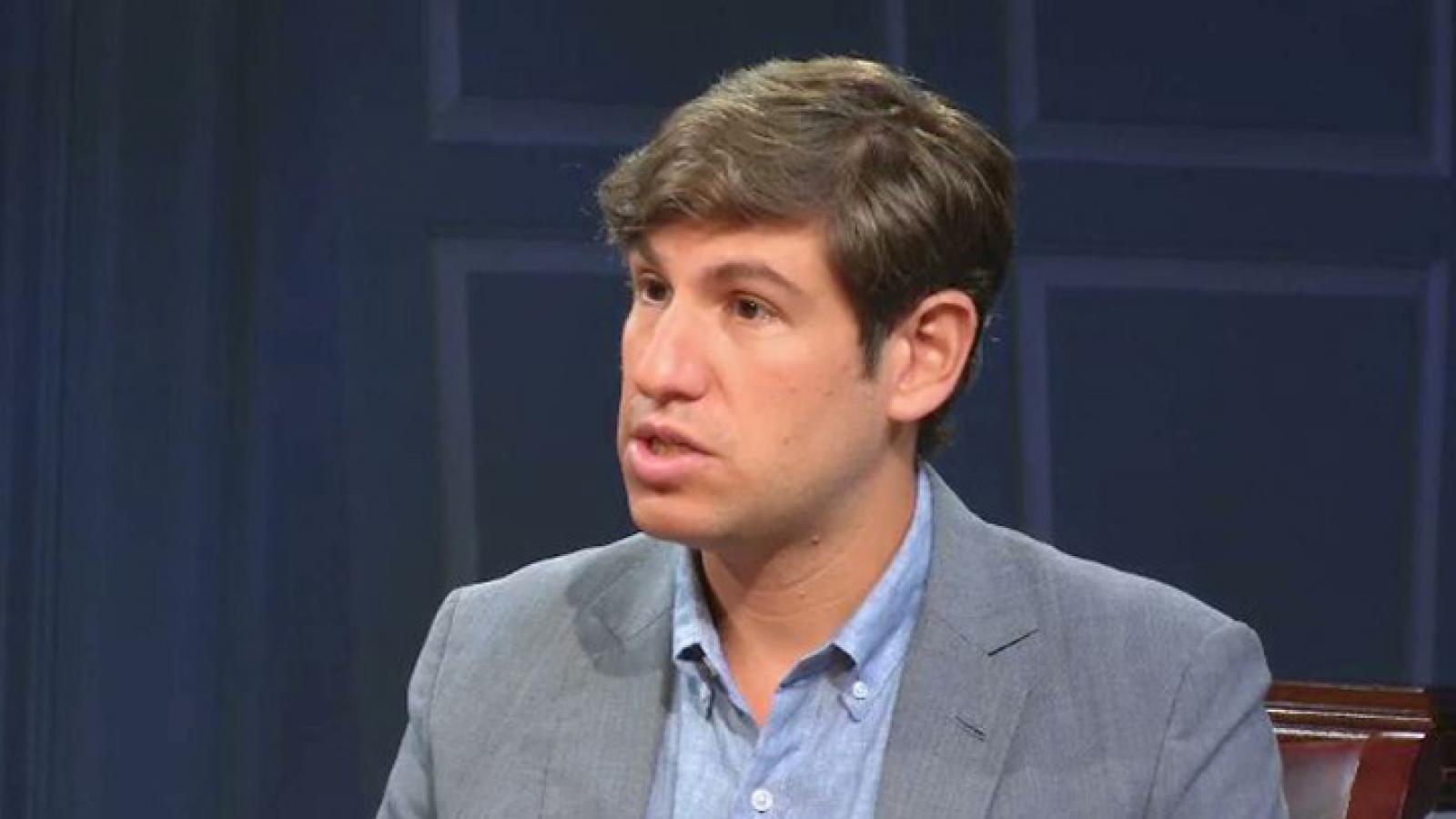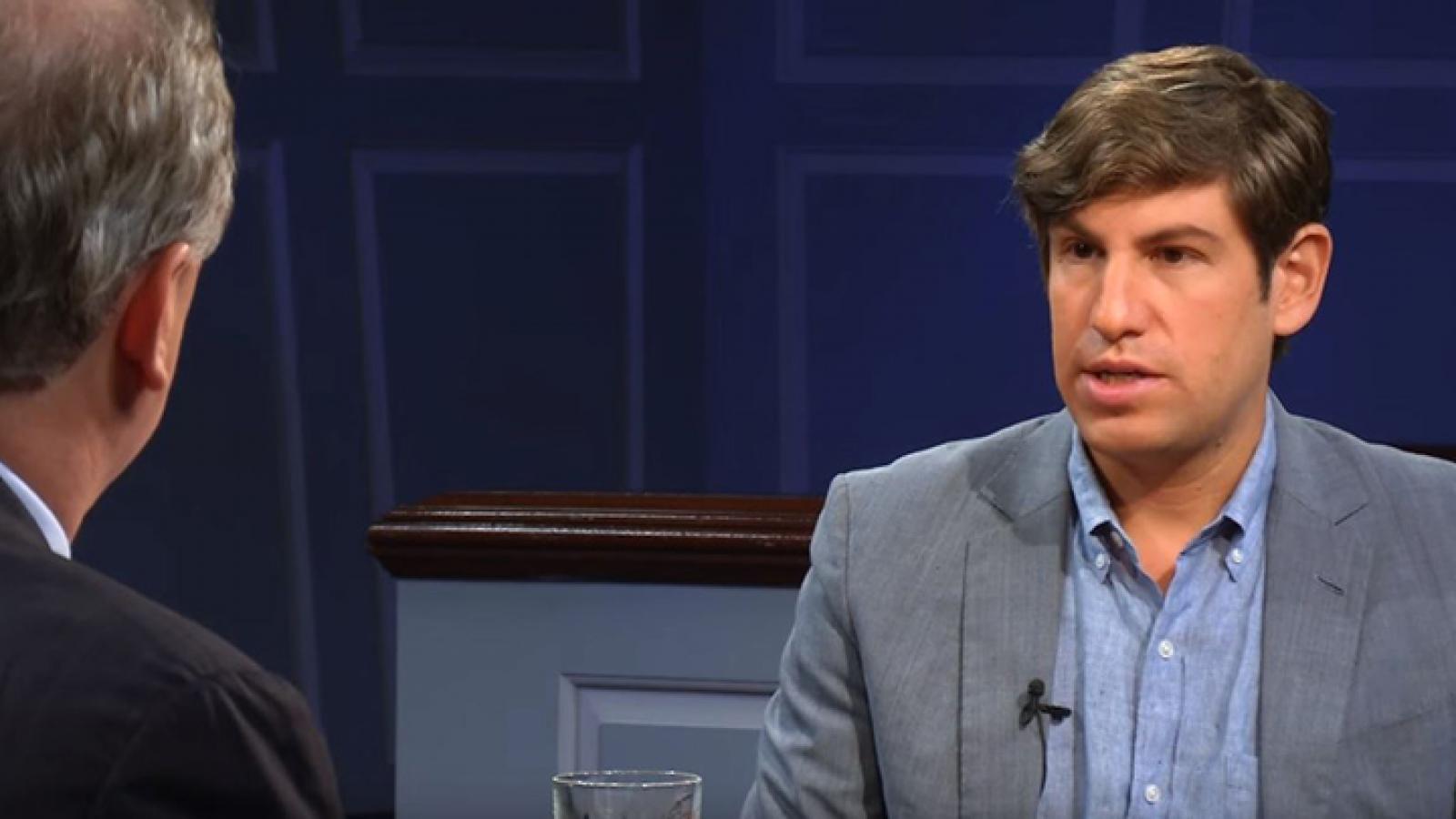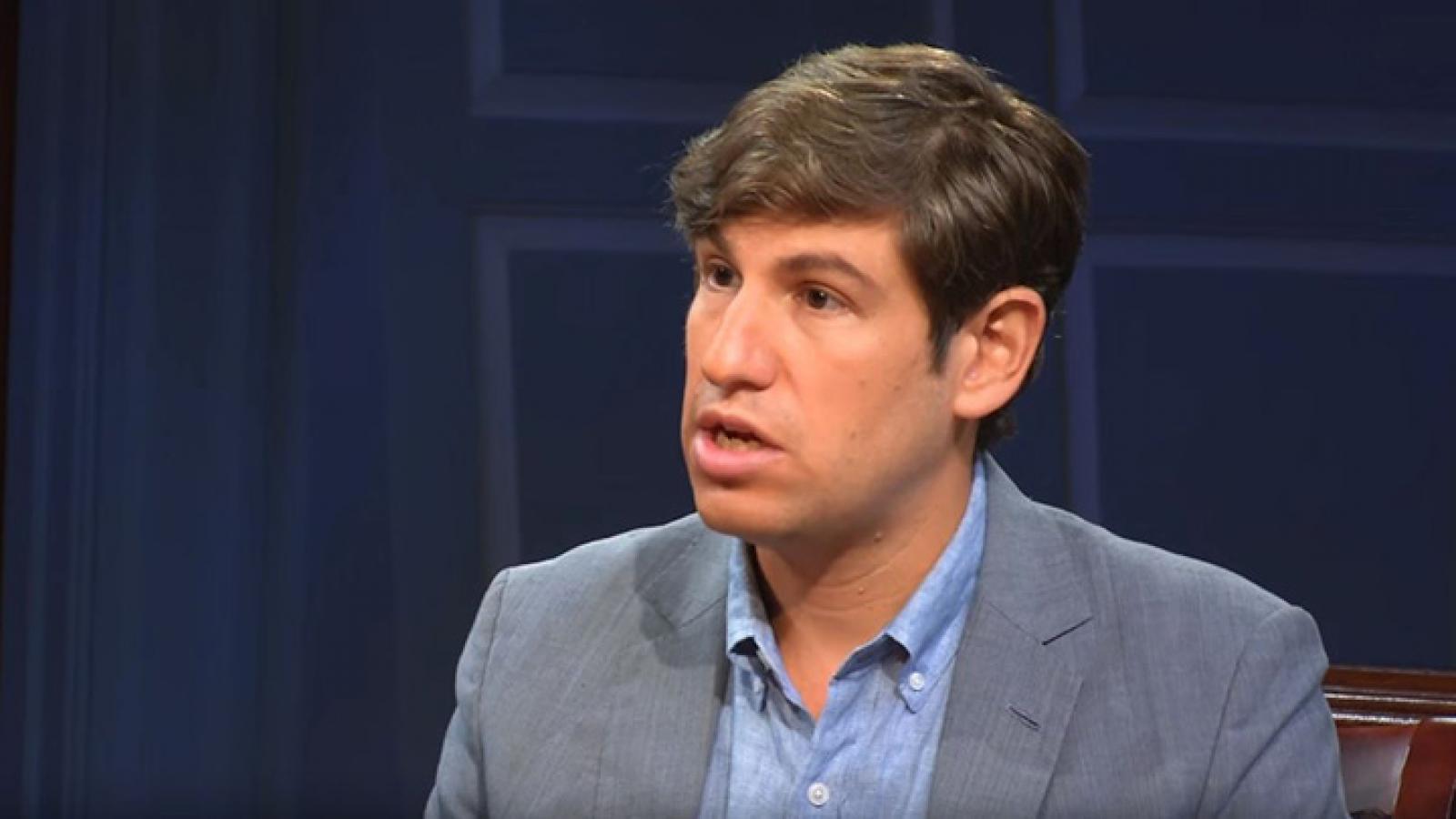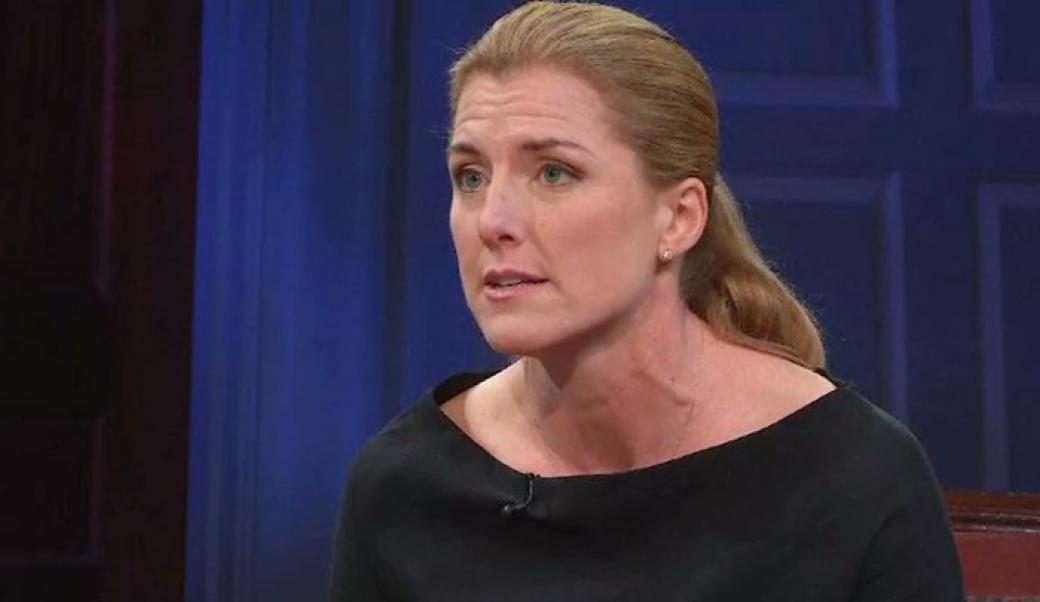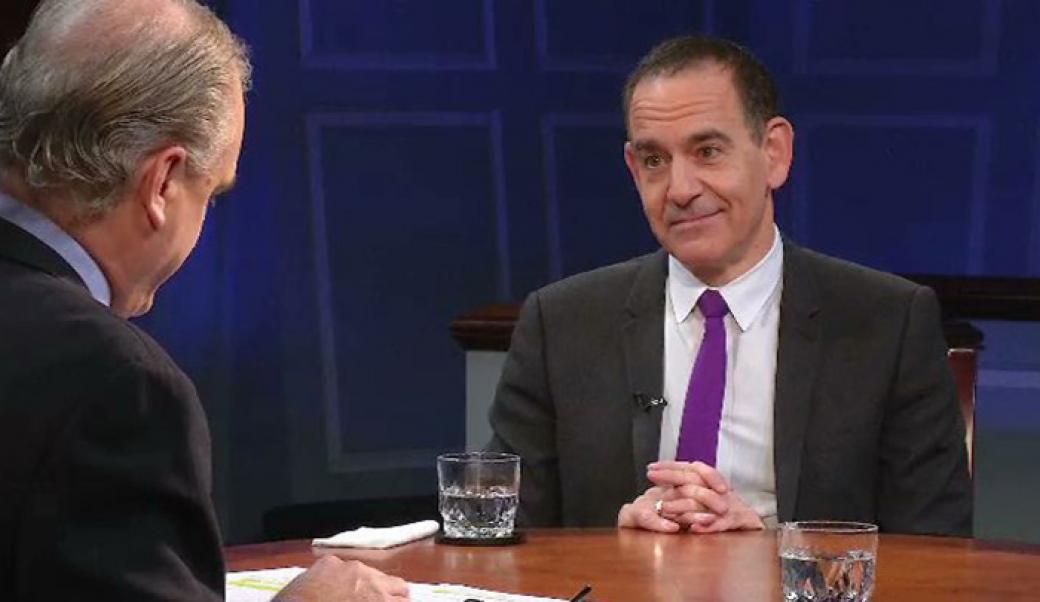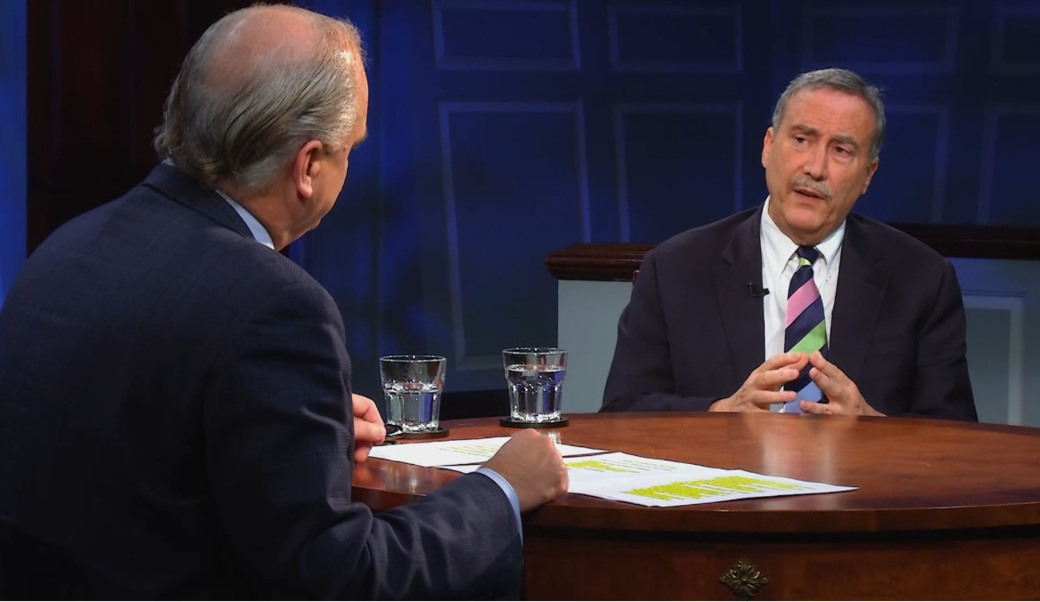About this episode
August 05, 2016
Ari Berman
Countless books have been written about the civil rights movement, but far less attention has been paid to what happened after the dramatic passage of the Voting Rights Act (VRA) in 1965 and the turbulent forces it unleashed. "Give Us the Ballot" tells this story for the first time. In this groundbreaking narrative history, Ari Berman charts both the transformation of American democracy under the VRA and the counterrevolution that has sought to limit voting rights, from 1965 to the present day.
Elections
The modern struggle for voting rights
Transcript
11:08:25;27 Douglas Blackmon: Welcome back to American Forum. On the surface the campaigns to decide who will be the next U.S. President are all about convincing voters who to vote for or who to vote against. But there is another less obvious struggle underway at the same time that one is about who gets the vote? Should all voting be on the same day or spread across many days to make it easier for more citizens to participate? Should we be required to show our drivers licenses to make sure no one votes twice? Should the boundaries of congressional districts follow the national geography of our states and cities? Or should they be customized to increase the odds that minority voters will always have representatives in elected office? Our guest today is Ari Berman a writer for the Nation Magazine and the author of a new book about that battle over who will vote. Give Back the Ballot: The Modern Struggle for Voting Rights in America. Thanks for joining us Ari.
11:09:20;17 Ari Berman: Thanks for having me Doug.
11:09:22 Blackmon: You make a pretty bold claim in your book. You say, not just, you say that the recent changes in election law and decisions by the supreme court that have worked against the Voting Rights Act of 1965, you say that those are not just bad policy but they actually represent a kind of counter-revolution and one that conservative members of the Supreme Court are conspirators in of a sort. But, so, what do you mean by that?
11:09:49;23 Berman: Well if you look at the history of the Voting Rights Act, the Voting Rights Act of 1965 was meant to end decades of discrimination against African Americans in the South and it was a transformative piece of legislation. It outlawed literacy tests and poll taxes, it sent federal officials to the South to register black voters in segregationist strong-holds like Selma, Alabama. It kept federal officials in the South to monitor elections to make sure they weren’t stolen. It forced those states with the worst histories of voting discrimination to actually have to approve their voting changes with the federal government to prevent discrimination in the future. All of these things were transformative and they led to a revolution in American politics it made America a truly multi-racial integrated democracy. But the Voting Rights Act didn’t settle the debate over voting rights and there has been a 50 year effort to try and roll back the protections of the Voting Rights Act which I detail in my book and if you look recently that counter revolution against voting rights has become quite successful. We have a Supreme Court that has struck down one of the centerpieces of the Voting Right Act in 2013. We have state legislatures all across the country that are passing laws making it harder to vote and we have a congress that has done nothing about this problem. And so, for all of those reasons I believe there has been a counter-revolution against the Voting Rights Act and we’re seeing that play out today.
11:11:18;21 Blackmon: But in terms of counterrevolution, uh, I mean, is it also possible that it is just an honest disagreement about what makes the most sense or do you. Or do you see in the, in this strategy, uh, an explicit intent to dep-, to deprive certain people of the right to vote?
11:11:34;08 Berman: I see it as an attempt to deprive certain people of their right to vote. I think that’s what it’s always been about. If you look at the history of the Voting Rights Act, days after it was passed you had Southern officials who wanted to challenge the constitutionality of that law to prevent, uh, newly registered African American from participating in the political process. This was done all across the South. Alabama, Georgia, South Carolina, they all challenged the constitutionality of the Voting Rights Act and even after that failed the Supreme Court upheld the constitutionality of the Voting Rights Act a year after Bloody Sunday in Selma. So on Sunday so March 7, 1966 the Supreme Court help up the constitutionality of the Voting Rights Act then what you’re starting to see is states like Mississippi begin to change their election laws to prevent newly registered African American voters from being able to run for office, to hold elected office, to hold real power in terms of representation and that was a battle over many decades. And then you saw officials particularly in the conservative movement try to limit the power of the Voting Rights Act, so even after it was upheld by the supreme court, even after it was reauthorized by the Congress, you saw concerted attempts to try and limit political representation or political power for Blacks, Hispanics other minority groups and that is an effort, uh, that has continued to this day. So while it may be a good faith disagreement between two different factions, between two different ideologies, certainly certain voters are being targeted over and over again by this counter-revolution.
11:16:12;11 Blackmon: The Voting Rights Act at that time does away with these antiquated kind of absurd looking barriers that were in place up to that time that opens this flood gate of African American voters that goes from in total in the South in something like one third of African Americans who were eligible had been registered before 65 and it goes to 75 percent or something like that. But these vast, vast increases in the number of voters hugely increased number of black elected officials but the act also then, for what would happen after that put the Department of Justice in this regulatory role uh, to uh, uh, then to, then had to all changes in election law had to meet with the approval of the Department of Justice and that’s really what the conflict is all about.
11:17:18;03 Berman: It really all started in Mississippi a place that you’re very familiar with because after the constitutionality of the voting rights act was upheld in 1966 Mississippi held a special legislative session and they passed 13 voting changes to try and limit the power of newly registered African Americans. And the Supreme Court in a very influential 7 to 2 decision said that the right to vote and the voting rights act governs everything to making a vote effective. So it wasn’t just about the right to vote but the power of that vote that these newly registered voters would actually have real representation and to ensure that they said to states like Mississippi you have to approve your voting changes with the federal government to make sure you’re not doing new things that will dilute the power of this growing minority vote and that gave the federal courts and the justice department a, a tremendous amount of power that it didn’t have before the passage of the voting rights act of 1965. And what we see this provision known as section 5 of the act it blocked 3,000 discriminatory voting changes, potentially discriminatory voting changes from 1965 to 2013. So this was a provision that wasn’t just important in the 1960s it really gave the federal government an incredibly powerful way to stop voting discrimination in the decades after the voting rights act passed as well.
11:19:23;15 Blackmon: Yeah, and you, and you quoted in the book uh, it’s just one particularly remarkable uh, line from a letter from 1909 uh, by an Alabama congressmen writing to someone else, “we’ve always as you know falsely pretended that our main purpose was to exclude ignorant men from the vote when we were trying in fact not to exclude the ignorant, uh, ignorant man from the vote, when in fact we were trying not to exclude the ignorant vote but the negro vote.” And, and so there is this long, long history of claiming that uh, that these restrictions to voting were about making sure that only educated people or, or qualified people or property owners that, that the better citizens would be those who participated in voting and that is an issue that goes back to the founding of the republic who should vote, uh, which, which kinda person should vote but what is very clear in the record now is that this long history as it effected African Americans was explicitly about keeping black people from voting not keeping poor or ignorant, I certainly know that lots, many of my poor and ignorant white relatives and ancestors did a lot of voting when no black people could.
11:20:22;05 Berman: I’m sure they would be happy to hear you describe them that way. We are founded as a democracy that essentially believes in liberty and justice for all but we’ve always limited justice and liberty and representation for large segments of the society whether it was in 1776 or 1861 or it was in 1965. And so, when there have been efforts to make it harder to vote I think those efforts have to be scrutinized very heavily in light of our history and in light of the fact that there has always been rationalizations for making it harder to vote when there is always something been something deeper going on beneath the surface and I think that was true in 1965 and I think it remains true today.
11:23:08;19 Blackmon: But the argument on the other side of this is that 50 years have gone by that these crude provisions that blocked African Americans from voting for so long have gone by the wayside that there is now very high level of voter registration among people of all backgrounds and ethnicities
11:24:06;03 Berman: Well, I think we have made a tremendous amount of progress since 1965. But there’s another story, a less comfortable story that shows that there’s always been attempts to try to roll back that gorses and that voting discrimination is sadly not a thing of the past. And I began covering the issue of voting rights after the 2010 election when all these states flipped from blue to red and I noticed that states across the country, not just in the south, were passing new voting restrictions. These were things like cutting early voting, shutting down voter registration drives, purging the voting roles, disenfranchising ex-felons, and requiring strict government issued ID to cast a ballot. None of which really being asked for or uh done before, and this was being done in crucial swing states like Florida, Ohio, Wisconsin, Pennsylvania, also in deep red states uh like Texas. And it seemed to me like an effort, after President Obama’s election, to make the electorate older, white, and more conservative, and also smaller as opposed to younger, more progressive, and more diverse, and a larger electorate which we saw in 2008 when we had record turnout uh for President Obama. And so that to me showed that voting discrimination was not a thing of the past. That these were things that were particularly aimed at voters of color who used things like early voting at a higher rate or didn’t have a government issued ID in the same numbers as white voters. And the fact that this was happening after the election of the first black president, I thought was was really disturbing, and the that more that I studied the history of voting rights and the history of the voting rights act I realized that these incredible periods of progress whether it’s under reconstruction or it’s under President Obama, are always followed by an equally intense backlash. So for the Supreme Court to strike down the Voting Rights Act the uh a key part of the Voting Rights Act after we had just come out of election cycle in which all these states had made it harder to vote was really kind of a dissonant experience for me. I had been covering the 2012 election through the lens of who could and could not participate in these crucial swing states, and here you had John Roberts on the Supreme Court talking about how much the country had changed. Now it was true that some of these southern born barriers of the ballot box had migrated north, uh to places like Wisconsin and Kansas and Pennsylvania, which did not have a lot of discrimination in the same way that Alabama or Mississippi did. That may have been a reason for the Congress to say maybe we should expand the voting rights act, maybe we should pass some sort of boarder election reform as you said otherwise. It was not a time to say that because you are not catching everybody, you can’t catch anybody.
11:27:14:16 Blackmon: How do you square that then with in the 2012 election, the great story of 2012, was in fact, lowering voting by whites, and uh older votes, and uh uh older voters, that was a big reason why Mitt Romney lost uh and that you had more people participating in extended election periods than any previous election. So it doesn’t seem that 2012 really turned out as badly as those indicators that suggest it was going to.
11:27:44;07 Berman: Well there was two reasons why that didn’t happen. Number one, many of these laws were challenged in court and ten major voting restrictions were blocked in advance of the 2012election. So a lot of these barriers weren’t in affect. The second thing is that there were massive mobilization campaigns to get people to the polls because of these restrictions. And when I visited swing states like Ohio and spent time in the African American community in cities like Cleveland, people were extra motivated to vote because they saw Republican officials cutting early voting and doing things like that they thought and they saw clearly were aimed at reducing black turnout. So there was a backlash to the backlash uh as I call it. And that’s why there was higher turnout in 2012. But it only happened because so many of these laws were blocked in court. And so the fact that the Supreme Court has gutted the voting rights act, that new restrictions are in place in Texas, North Carolina that weren’t in place in in 2012 that the 2016 election is going to be the first presidential election in 50 years without the full protections of the voting rights act means that the potential for these laws to do harm are much greater than they were in 2012.
11:28:52;08 Blackmon: And a big part of your book and the latter part of it is devoted to uh North Carolina in particular, and this very spirited campaign and back and forth.
11:29:24;19 Berman: Yeah, so what happened after the Supreme Court gutted the voting rights act is that a month after that decision North Carolina passed a sweeping rewrite of its election system that essential repealed or curtailed everything in that state that made it easier to vote. So they not just added uh strict voter ID requirement but they cut early voting, they eliminated same day voter registration, they eliminated pre-registration for 16 and 17 year olds which was taught in high school’s civics class, they even eliminated citizens’ awareness month which was really run by the state to encourage people to vote. And all of this was put in one bill. We had seen states pass one of these things, or another of these things, we’d never seen them all put in one piece of legislation. The backstory here was that North Carolina jumped from 37th in voter turnout in 2000 to 11th in voter turnout in 2012 after they passed new voting reforms. And black votes in particular increased and black turnout and black registration surpassed white voter turnout and white registration in the 2012 election in North Carolina and that was the context for why these new restrictions were being passed. What we saw on Election Day in 2014 is that longtime voters in North Carolina, including you know members of the military that I describe in my book, they showed up during early voting and they expected to be able to register to vote uh and they were no longer able to do so uh because same day registration had ended. So let’s say you you were member of the military, you were based in one county and you moved to another county after you were discharged. This happens a lot in a state like North Carolina that has uh a lot of military bases. Previously, you could show up during the early voting period, you could update your registration, and you could vote, where you now live. You can no longer do so and so we saw many instances of people not realizing the law had changed, showing up, believing they could update their registration. They were not able to, their registration deadline had passed and they were not able to vote. And what we saw in North Carolina is that, this group Democracy North Carolina found 2,300 instances of people who were turned away in 2014 by these new restrictions who would have been able to vote in 2012 or in previous elections. And they estimated that the number was actually much higher, that probably tens of thousands of people did not comply or were not able to comply with the laws. In terms of voter ID, it’s very interesting. Let’s look at Texas for example, uh Texas is a state where there’s been lengthy trials of that state’s voter ID law. And the courts have found that 600,000 registered voters in Texas don’t have a strict form of voter ID. That’s about five percent of the electorate. That not only do they not have that ID they have trouble accessing it, that you have to pay for underlying documents like a birth certificate to be able to get access to a uh drivers license for example. That costs money, which is why the law has been described by at least one judge as a poll tax. Then, there’s a whole question of of access to it. Driving is not a fundamental right, voting should be a fundamental right, so nowhere do we encourage people to drive in the same way we encourage people to vote. So there’s a real burden here. There’s a burden that falls across the spectrum but I think it fall particularly uh on historically disenfranchised voters who have less access to the political process, on poor voters, elderly voters and that’s why this law has been struck down on numerous occasions, uh not just by liberal judges, but the most recent decision was by a court of appeals uh a unanimous court of appeals written by a George W. Bush appointee. There’s also been no evidence of voter impersonation fraud, in Texas or elsewhere to justify these new ID requirements. For example, there have been a billion votes cast since 2000, but only 30 credible cases of voter impersonation fraud. So this is not just a big problem but I’m not against requiring some sort of ID that not every has, and that there is no real need for. So I think that this is largely a manufactured problem, I think it sounds like common sense but if you look at the data, there’s not a need for it and is burdening a uh serious and significant segment of society.
11:36:35;20 Blackmon: It’s ironic, I think, uh like a lot of issues in our polarized society now, uh part of the difficulty of moving through these, these questions is that on both sides no one seems capable of believing what is a fundamental premise of the other side. But this is something that uh folks who would disagree with you say over and over again that there is tremendous amount of voter fraud. And in fact, there once was uh actually as part of the segregation era efforts to pervert elections there was a tremendous amount of voter fraud, People who were dead were put on the registration rolls and there were hundreds of thousands of black votes in the late 19th century that were fraudulently to elect white candidates. And so there’s a long history of voter fraud. Uh but it doesn’t appear to empirically be happening anymore. But if you’re on that side of the equation it’s pretty difficult to believe it’s not still happening. And on the other side it’s difficult for a lot of people to really believe that there are folks in our society uh who just can’t come up with the documents to get a drivers license or ID.
11:37:53;12 Berman: I’m not interested in hyperbole. As a journalist I’m interested in data uh and the empirical reality. And I’ve looked at all the data, I’ve read all the trial transcripts. I’ve visited all these places and I’ve heard the stories. So I know that people are being burdened by these laws. I know that voter impersonation fraud is incredibly rare.
11:40:29;20 Blackmon: Justice Scalia, uh referred to the Voting Rights Act, in one point, as a phenomenon that is called “perpetuation of racial entitlement” uh, which is pretty striking. And then in other regards I don’t think he was really talking about voting at the time, but he was talking about affirmative action generally and that it is a mistake for African Americans to be treated any way that is distinctive from any other ethnicity and the idea that African American—that the laws as they apply to that group should be the same as how the Italians are affected, or Poles, or Jews, or anybody else. Um, but what’s your reaction to this notion that somehow the Voting Rights Act overtime became a perpetuator of a kind of racial entitlement?
11:41:24;00 Berman: Well, it’s a really outrageous statement if you look at American history. We had decades of discrimination against African American voters and the Voting Rights Act wasn’t an entitlement, a special treatment, it was giving a fundamental right to people who had been excluded from the political process for so many decades, wrongly, unfairly. It was morally wrong, as Lyndon Johnson said when he introduced the Voting Rights Act. He said, “it’s wrong, morally wrong to deny any of your fellow Americans the right to vote.” So, Lyndon Johnson didn’t just make a political case for the Voting Rights Act, he made a moral case, that we can’t live in a democracy where an entire segment of the population is excluded from participating. So, the Voting Rights Act didn’t bring entitlement, it brought equality to this country. And to view the Voting Rights Act as a racial entitlement, to me just shows how ideological someone, like Justice Scalia, has become. But, unfortunately, he was not alone. Look at John Roberts, chief justice, who was a young lawyer in the Reagan Justice Department. He wrote memo after memo after memo in the 1980s arguing that the Voting Rights Act would lead to affirmative action in the electoral sphere, would lead to a quota system in electoral politics, so the arguments that Justice Scalia are making are arguments that have been widely embraced in the conservative movement against the Voting Rights Act. They have been made in slightly more subtle terms by the Chief Justice himself and unfortunately what begun as a law that was widely hailed to bring full equality, a large segment of the conservative base, now views very differently and in quite a more sinister way.
11:44:19;09 Blackmon: To whatever degree that there is any kind of entitlement that was created by the sequence of events, uh I think that probably would be referring to the creation of these primarily urban congressional districts that are overwhelmingly or very significantly African American
11:45:40;48 Berman: You have to look at the context in which these districts were drawn. In the 1980s, for example, the African Americans made up 25 percent of the South, but held only five percent of elected states and this was 15, 20 years after the passage of the Voting Rights Act. So you had to do something to increase representation because white elected officials weren’t just gonna give up power voluntarily—particularly those white democrats that had ruled the South for so many years. So, drawing these new majority-minority districts, as they became known was a solution to this problem. That you had to create some sort of representation as civil rights lawyers at the time said. You had to go from none to some. And if that meant grouping African Americans in one district, if that was the only way to do it, and that’s what had to be done, and that’s what lead to people, like Bobby Scott from Virginia or John Lewis from Atlanta or Terry Sewel from Selma, to be elected to Congress. Without those districts they just wouldn’t have made it there. And I think we have to recognize that reality. That there was no alternative. Unfortunately, what happened was, as these districts were drawn, uh, there were, black voters were taken out of white democratic districts and they were put in these new majority-minority districts. The surrounding districts became whiter and more conservative and eventually more Republican. Nonetheless uh the drawing of these districts has resulted in some level of polarization. But, I’m not sure there was a better solution out there. That sometimes there are tradeoff in politics. There are, there are two bad solutions and you have to choose one of them uh and uh I think to some extent that happened with the Voting Rights Act. I also think that Republican officials, over time, have kind of taken advantage of this situation and put more and more African Americans, already in existing black districts
11:49:44;11 Blackmon: And as we go into the 2016 presidential election some of these southern states, like North Carolina and Virginia arguably, but probably not in this election, but uh but a future one, Georgia, are all places where the substantial numbers and minority voters and whether they are able to vote in the kinds of numbers that occurred in 2012, 2008, could in fact be decisive in the outcome of the presidential election.
11:50:45;27 Berman: Well, voter turnout is going to be critical in 2016 and minority voter turnout is going to be critical in 2016. And what we’re seeing is that this is the first presidential election in 50 years without the full protections of the Voting Rights Act. As it stands now, 15 states are going to have new restrictions in place for the first presidential cycle in 2016. Uh these are pivotal swing states, like Wisconsin and North Carolina. Some of these high profile new restrictions are being challenged in court in places like North Carolina and Texas, but. B, but would expect, not only will there be court battles, but there will be new efforts to make it harder to vote closer to the 2016 election uh both at the national level and the and the state level and at the local level—um, but but this debate over voting rights is not ending any time soon because as the demographics of the country continue to change, real power is at stake, and that’s what the Voting Rights Act has always been about. It’s been about power—giving power to those who have been shut out of power for so many years, leading to some level of equality and representation that didn’t exist before—that was a huge triumph, but it was also something that’s been challenged over a 50 year period, and so I think we remain in the situation where what should be considered one of the most fundamental rights, the right to vote, remains the most contested.
11:52:05;30 Blackmon: Thank you.
11:52:06;11 Berman: Thank you very much.
11:52:07;22 Blackmon: Ari Berman, the Nation Magazine and author of Give Us the Ballot. Thanks for being here. We hope you’ll join the conversation with American Forum and our guests by following us on Twitter and Facebook. To send us a comment about this program, or download podcasts or transcripts, visit us at millercenter.org/amerricanforum. I’m Doug Blackmon. See you next week.
